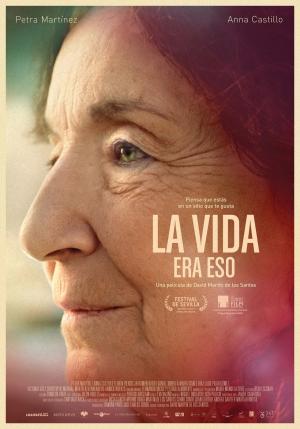La vida era eso is the first feature film of the Spanish director David Martín de los Santos. At the Q&A following the first screening of the movie in the TIFF 2021 Competition, the director-screenwriter dedicated the film to his mother and, in general, to the women of the Franco era in Spain (1938-1975). In fact, the film is deeply contemporary and not exclusively localizable in the country of origin of most of its protagonists. Any woman over 60s, retired and, to a large extent, freed from the tasks and responsibilities with which society has accustomed her, can easily empathize with the story. Briefly put, the movie is about confronting the question: we still have a life, how do we proceed?
It is complicated to translate the. TIFF programme says Life was that. The best solution offered by the Hispanics in Cluj would be This is what life is about. Language issues, after all.
In an impeccable Belgian hospital ward (the selection of TIFF 2021 films offers, among other things, the chance to compare the conditions and atmosphere in hospitals on the route Budapest (Preparations to be together for an Unknown Period of Time) - Ljubljana (Deadlock) - Brussels), a retired Maria (Petra Martínez), former emigrant from Spain, and a recent emigrant from Spain, the young Verónica (Anna Castillo), meet for a few days which will prove to be decisive for both their destinies. Later in the movie, Maria will go on a spectacular journey to the south of Spain, where she will meet and attach herself to two very special characters: a day labourer, Juan (Daniel Morilla), and a bar and motorcycle owner, Romanian Luca (Florin Piersic Jr.).
La vida era eso reverses the poles of ages and proposes to an elder woman a formative and spiritual journey through life and her inner self (Bildungsroman-like), during which guides are a number of young people for whom living is a matter of here and now, as if there will be no tomorrow, as if there was no yesterday. A remarkable professional, Petra Martínez embraces with so contagious joy the adventures staged for her by the rookie de los Santos, that, in the discussions carried out in the warm night after the screening, some spectators feel sorry that she did not go further in the various erotic relations suggested by the script (with Luca, with the sea, with herself). 77 years old, the actress born in Jaén (just 200 km from the Almería area where most of the film's action takes place) returns to childhood Andalusia with a formidable zest for life and playing.
And yet, the great revelation of La vida era eso, beyond any local patriotism, is Florin Piersic Jr., probably in his most charming role in his film career. Privileged by the excellent intuition of de los Santos to allow him to express himself in a delicious combination of Romanian, English and Spanish, Florin brings to the screen all his theatre charisma. At times, he confiscates the film, while his character changes the dynamics of the movies and strengthens its relationship with the audience. However, this latter effect might be specific for Romanian audience, who understands and laughs with lust and emotion at all the national-culinary-alcoholic references.
But beyond his sparking - manly side, Florin Piersic Jr.'s character makes a major contribution to the sub-theme of how ordinary people relate to the labor market in the European Union of the 2nd decade of this centyr: Verónica leaves Spain in search for a job in Belgium, Luca travels fpr the same purpose from Romania to Spain, Juan, the only one who refuses to emigrate, engages in any type of work in order to make enough for a living. Maria and her husband have also emigrated sometime ago in Belgium (probably to follow their eldest son, married there).
The relationship of all these characters with the home country is complex. Luca posts on the walls of the bar labels with the maps of Romania and listens to Mondial rock band, Verónica refuses to talk about what she left behind, Maria stares at the huge pomegranates that grow in the dust and wind of Almería.
As for life and what it is, perhaps the essential questions, the ones that Verónica's presence raises for Maria (further on boosted by Luca), are: when does a woman decide that she has aged? When does one give up croissants, cigarettes, orgasms, lust, risk? When, how, why? And, above all, is this giving-up an irreversible phenomenon?
About cornuleţe, vişinată, ţuică and other angels - La vida era eso / Life was that in TIFF Competition, 2021
Mihai Brezeanu
Resurse
Alte articole de Mihai BrezeanuCronici ale altor filmeArticole similare
Un film românesc îți arată puterea distrugătoare a internetului - #dogpoopgirl / Iulia BlagaCatcher in the poppy field sau De veghe în câmpul de maci / Roxana PavnotescuVedere de sus cu înger și dronă - Neidentificat / Roxana PavnotescuComing out-ul se amână - Câmp de maci la Premiile Gopo, 2022 / Cristian CaloianBun de tipar - Întregalde / Lucian MaierToate articolele despre Festivalul TIFF 2021Scrieţi la LiterNet
Scrieţi o cronică (cu diacritice) a unui eveniment cultural la care aţi participat şi trimiteţi-o la [email protected] Dacă ne place, o publicăm.
Vreţi să anunţaţi un eveniment cultural pe LiterNet? Îl puteţi introduce aici.
Publicitate
